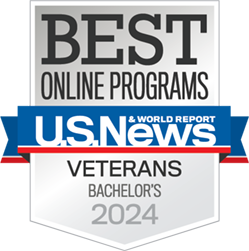
An Accredited Dual Degree to Help You Excel in Your Career
100% Online
48-60 Months*
*The total number of credits and duration of the program depend on the number of transferred credits
*Indicates required field
- Read: Privacy Disclaimer Acknowledgment
-
By providing your phone number on this request information form, you have authorized the George Washington University, and its representatives, to send you SMS/Text messages in conjunction with the services you have requested. Message and data rates may apply.
If you no longer wish to receive SMS/Text communications from GW SMHS, you will have the option to opt-out.
By submitting this form, you confirm you have read the Privacy Notice.
Impact Change in Health Care through Expert Management and Top-Quality Patient Care
Discover what it takes to manage a clinically effective, cost-efficient, healthcare delivery system while meeting the demand for quality-based patient care with the George Washington University’s (GW) online Dual Degree: Bachelor of Science in Health Sciences (BSHS) Clinical Operations and Healthcare Management/Master of Science in Health Sciences (MSHS) in Health Care Quality. Learn from clinically experienced educators in a convenient online format as you gain the expertise to make a positive impact in one of the fastest growing fields in the nation.
This 87-credit/hour health science degree delivers the key skills needed to manage clinical operations across the continuum of care. Graduate with both a bachelor’s and master’s degree and enter the workforce as a competitively qualified healthcare professional.
Accreditation and Rankings
- GW is accredited by the Middle States Commission on Higher Education
- #62 Best National University*
- #13 Best Online Bachelor's Programs*
- #7 Best Online Programs for Veterans*
* The U.S. News & World Report – 2024 Rankings


Curriculum: Learn to Drive Clinical and Operational Decision-Making
In coursework for the dual BSHS in Clinical Operations and Health Care Management / MSHS in Healthcare Quality, you’ll study the delivery of healthcare services while focusing on key operational activities such as clinical decision-making, finance, human resources, informatics, marketing, policy, quality, and safety.
As part of this dual degree program, you can prepare for the following certifications:
- Fellow of the American College of Healthcare Executives (FACHE®) certification through the American College of Healthcare Executives (ACHE).
- Certified Professional in Health Care Information and Management Systems (CPHIMS®) through the Health Care Information and Management Systems Society (HIMSS).
- Certified Healthcare Financial Professional (CHFP®) and Fellow of the Healthcare Financial Management Association (FHFMA®) through The Healthcare Financial Management Association (HFMA).
- Certified Medical Practice Executive (CMPE®) and Fellow in the American College of Medical Practice Executives (FACMPE®) through the Medical Group Management Association (MGMA).
- Certified Professional in Healthcare Quality (CPHQ®) through the National Association for Healthcare Quality (NAHQ).
Why Choose a Dual Degree?
By completing nine credits of graduate coursework as part of the BSHS in Clinical Operations and Healthcare Management, you can then complete your MSHS in Health Care Quality in around four semesters rather than six.
You’ll also save money because the nine credit hours of graduate coursework that are part of the BSHS program will be charged at the undergraduate tuition rate instead of the graduate tuition rate. Plus, you can transfer up to 60 credits for previous coursework from regionally accredited institutions.
Program Outcomes
Program outcomes for the BSHS in Clinical Operations and Healthcare Management:
- Apply knowledge of healthcare services’ topics, forces, and factors that influences the present and future direction of healthcare.
- Integrate the influences of individual behavior, the environment, communication, and health information technology to support excellence in the clinical operations healthcare management.
- Apply the core managerial knowledge, practice leadership and managerial, and quantitative skills of clinical operations healthcare management needed that will positively affect performance as a healthcare manager.
- Engage in critical and innovative thinking, reflection, and problem-solving through evidence-based practice in multiple healthcare settings to solve complex healthcare problems.
- Apply the theories and practices of clinical operations healthcare management in the practice setting.
- Explain structural determinants adversely impacting the health of socially disadvantaged groups from diverse perspectives.
Program outcomes for the MSHS in Health Care Quality:
- Distinguish quality improvement, patient safety, leadership, organizational, and research theories/standards applicable to healthcare.
- Implement quality and patient safety improvement initiatives.
- Utilize information technology systems to support quality assurance.
- Lead organizational change to sustain a quality-focused culture.
Career Outlook
When you graduate with your dual BSHS in Clinical Operations and Healthcare Management / MSHS in Health Care Quality, you’ll have marketable skills in data management, analysis of clinical research, and organizational leadership so you can help fulfill increased demand for health care services.
The U.S. Bureau of Labor Statistics projects a 32% growth in the employment of medical and health services managers from 2019 to 2029, which is much faster than average.1
With this dual degree, you could fill the following roles with these median yearly salaries:
- Clinical Director, Quality Services: $89,6142
- Clinical Nurse Auditor: $69,9923
- Compliance Auditor/Analyst: $59,3054
- Director of Quality Assurance: $116,4045
- Health Care Manager: $65,6286
- Health Care Quality Analyst: $56,4977
- Medical and Health Services Manager: $104,2801
- Patient Safety Specialist: $98,5008
- Quality Assurance Consultant: $77,9499
- Quality Improvement Nurse: $79,49710
Admission Requirements
To apply for the dual BSHS in Clinical Operations and Healthcare Management / MSHS in Health Care Quality, you’ll need the following:
- Completed application and $80 application fee
- 3.3 GPA or above on a 4.0 scale for all previous college-level coursework
- Résumé/CV
- Statement of purpose
- At least 45 credit hours of college-level coursework or an associate degree
- One letter of recommendation from a previous instructor or employer
If you have an associate degree from a participating D.C., Maryland, or Virginia community college, you may be eligible for guaranteed admission to this program. Review the list of participating institutions or complete this form to speak with an Online Admissions Advisor for more details.
Tuition Details
The dual BSHS in Clinical Operations and Healthcare Management / MSHS in Health Care Quality at GW consists of 87 credit hours. Nine credit hours of graduate coursework that are part of the program will be charged at the undergraduate tuition rate instead of the graduate tuition rate. Review the cost per credit hour and total estimated program costs.
Note: Tuition rates are subject to change and additional fees may vary by program.
Meet the Program Directors

GW’s experienced faculty provide you with the rich, practical knowledge and support needed for you to succeed in the program and in your career.
Mountasser Kadrie, PhD, MHA, FACHE, FACMPE, FHIMSS
- Read Full Bio
-
Dr. Mountasser Kadrie has over 25 years of healthcare executive experience, from holding executive leadership appointments at world-renowned health systems, academic medical centers, and higher education institutions. His expertise has been focused on promoting strategies for maximizing health care performance through innovation and digital transformation.
Dr. Kadrie is a double Fulbright awardee, a Fellow of the American College of Healthcare Executives (FACHE), a Fellow of the American College of Medical Practice Executives (FACMPE), and a Fellow in Healthcare Information and Management Systems (CPHIMS). He has served as a Board Examiner for the Baldrige Performance Award Program at the National Institutes of Standards and Technology (NIST).

Sabrina Figueiredo, PhD, MSc
- Read Full Bio
-
Dr. Figueiredo is a graduate of McGill University where she earned a Master of Science and a Ph.D. in Rehabilitation. Her graduate training involved designing and conducting multiple randomized pilot studies, cross-sectional surveys, longitudinal prospective studies, and systematic reviews. She has a strong background in data analysis, having used complex statistical models such as group-based trajectory modeling. Prior to her graduate studies, Dr. Figueiredo earned a Bachelor of Science in Physical Therapy and a Graduate Certificate in Higher Education.
Before joining the GW community, Dr. Figueiredo served as Assistant Professor at the Pontifical Catholic University of Minas Gerais (Brazil) and at McGill University (Canada). She has extensive teaching experience, including having taught to more than 1000 students the course Research Methodology and Foundations of Professional Practice, which comprised principles of Global Health, the Canadian Health Care System, and the role of OTs and PTs in the different health care settings.
During her tenure at McGill University, she was also the Associate Director of the Physical Therapy Program, and oversaw initiatives related to curriculum development, program evaluation, and accreditation. She created a Program Logic Model and an Assessment & Implementation Plan deemed best practices by the Canadian Physiotherapy Accreditation Regulatory Body.
Dr. Figueiredo’s research portfolio focuses on patient safety, coordination of care, creating innovative measurement strategies to contribute evidence to patient-centered outcomes as well as developing telehealth initiatives to improve seniors’ outcomes. She has published a book chapter and scientific papers in these fields and has received external funding and awards for her presentations at national and international meetings. In partnership with the Children’s National Hospital, Dr. Figueiredo is working on a research project to understand the impact of provider burnout in health care quality.
Sources:
- U.S. Bureau of Labor Statistics (2021 April 9). Medical and Health Services Managers. Occupational Outlook Handbook. Retrieved May 4, 2021
- Payscale (2021). Average Director, Clinical Services Salary. Retrieved May 4, 2021
- Payscale (2021). Average Clinical Nurse Auditor Salary. Retrieved May 4, 2021
- Payscale (2021). Average Compliance Auditor Salary. Retrieved May 4, 2021
- Payscale (2021). Average Director of Quality Assurance Salary. Retrieved May 4, 2021
- Payscale (2021). Average Health Care Manager Salary. Retrieved May 4, 2021
- Payscale (2021). Average Health Care Quality Analyst Salary. Retrieved May 4, 2021
- Payscale (2021). Average Patient Safety Specialist Salary. Retrieved May 4, 2021
- Payscale (2021). Average Quality Assurance Consultant Salary. Retrieved May 4, 2021
- Payscale (2021). Average Quality Improvement Nurse Salary. Retrieved May 4, 2021
*The total number of credits and program duration depend on the number of transferred credits.
Curriculum Details
147 total credits required
In 100% online coursework for the dual BSHS in Clinical Operations and Health Care Management / MSHS in Health Care Quality, you’ll study the delivery of health care services while focusing on key operational activities such as clinical decision-making, finance, human resources, informatics, marketing, policy, qualify, and safety.
You can complete this degree program in four to five years, and prepare for several industry-relevant certifications.
BSHS (17 courses, 51 credits)
- CML 3101 Management of Human Resources in Health Sciences Organizations (3)
-
Theory and application of management and leadership as they affect the management of human resources in health sciences organizations. Focus is on leadership, ethics, and organizational dynamics in a changing health care environment.
- CML 4144 Seminar in Health Science Leadership (3)
-
The goal of the course is to enable learners to propose and analyze multi-dimensional solutions that address complex issues encountered in the management and leadership of health sciences clinical enterprises.
- COHM 3142 Finance for Health Care Managers (3)
-
Introduction to key finance competencies necessary for clinical and healthcare operations; costs, expenditure, and reimbursement of services.
- COHM 4101 Marketing for Healthcare Leaders (3)
-
Skills needed by health care leadership to promote services and strategic change; theory and application of marketing principles for the purpose of project planning, organizational growth, and public relations.
- COHM 4110 Strategic Communication for Health Professionals (3)
-
Overview of health communication research, theory, and practice, examining the powerful communication influences on delivering care and health promotion.
- COHM 4145 Case Studies for Clinical Healthcare Management and Leadership (3)
-
Builds on prior coursework to apply clinical operations and health care management practices to a case studies format Students analyze and discuss real-life operational case studies from various health care organizations.
- COHM 4150 Practicum in Clinical Operations (3)
-
Supervised field work in clinical operations and health management, arranged in consultation with the program director. May be repeated for credit.
- HSCI 2050 Foundations of Health Equity (3)
-
The cross-cutting nature of the social determinants of health and clinical and biomedical implications in practice and research settings. This is the prerequisite course to begin the health equity micro-minor.
- HSCI 2105 Current Issues in Bioethics (3)
-
Basic issues, approaches, and requirements of ethically acceptable decision making with patients, including patient confidentiality, conflicts of interest, allocation of scarce resources, occupational risks in health care, and professional responsibility for overall quality of care.
- HSCI 2112W Writing in the Health Sciences (3)
-
Introduction to writing that emphasizes construction, evaluation, and organization of written communication of health science information. A blend of independent study and group work in which students perform as writers, reviewers, and editors. Includes a significant engagement in writing as a form of critical inquiry and scholarly expression to satisfy the WID requirement.
- HSCI 2117 Introduction to Statistics for Health Sciences (3)
-
Foundational concepts in descriptive and inferential statistics, including probability, sampling distribution, estimation, correlation, t-Test, simple linear regression, and chi-square. Application of statistical concepts and methods within the health sciences.
- HSCI 3113 Health Policy and the Health Care System (3)
-
Incorporates economic theory and policy analysis methodology to analyze the impact of changes in the health care system on the practice of health sciences professionals and the quality and process of health care. Development of critical thinking skills through review of current medical literature.
- HSCI 4103 Health Care Law and Regulation (3)
-
This is an upper division course intended to introduce students to the legal structures, rules, and mechanisms important to health care professionals, executives and organizations. Students analyze a range of legal standards related to medical malpractice and liability, fraud and abuse, and health care compliance. Since this is a health sciences course, trends in genetics, pharmacy law, and laboratory law will be discussed. In addition, students will become familiar with key legal terms, documents, and sources of law; the tools of communication and governance that shape health care arrangements and practices.
- HSCI 4106 Intro to Epidemiology for Health Sciences (3)
-
An introduction to epidemiological methods and their applications in the prevention and control of illness, community and clinical interventions, and health services.
- HSCI 4112W Research and Writing in Health Sciences (3)
-
Includes a significant engagement in writing as a form of critical inquiry and scholarly expression to satisfy the WID requirement.
- INFR 4101 Introduction to Medical Informatics (3)
-
Medical informatics applications and innovations in health care and the health care system; implications for health care delivery and patient outcomes, including electronic medical records, health system databases, and medical data analysis.
- RAFF 3101 Introduction to Regulatory Affairs (3)
-
Introduction to the field of regulatory affairs to regulations, strategies, and laws that apply to safe and effective product development.
The 3 graduate courses (9 credits) students take during the BSHS:
- COHM 6235 Leadership Development in Health Care Systems (3)
-
Overview of principles related to leadership, including theories and styles, organizational management and values, communication strategies, and change in the context of healthcare systems. Credit cannot be earned for this course and HSCI 6223.
- HSCI 6263 Biostatistics for Clinical and Translational Research (3)
-
Basic concepts and methods of biostatistics applied to translational research. Topics include distributions, populations and sample selection, variables, interaction and confounding, hypothesis formulation, correlation, t-tests, ANOVA, regression, and ch.
- HCQ 6200 Introduction to Health Care Quality (3)
-
An overview of the US health care system and the influence of health policy development and implementation on health care quality. Introduction to fundamental concepts of health care quality, patient safety, leadership, and change management. Applicants of the MSHS in Health Care Quality program may use the Certified Professional in Healthcare Quality (CPHQ) credential as an accepted equivalent.
MSHS (9 courses, 27 credits)
- HCQ 6201 Building a Quality Culture (3)
-
Covers the analysis of quality and patient safety challenges in U.S. health care with a focus on political and environmental influences.
- HCQ 6202 Health Care Quality Landscape (3)
-
Covers the analysis of quality and patient safety challenges in U.S. health care with a focus on political and environmental influences.
- HCQ 6203 Quality Improvement Science (3)
-
An introduction to quality improvement and patient safety theories, models, methods and tools and their application to quality and safety improvement challenges in health care.
- HCQ 6204 Health Care Quality Analysis (3)
-
Involves application of measurement, data management and statistical analysis principles to quality improvement and patient safety challenges. This course focuses on the importance and design of effective measures and the selection of appropriate analysis tools.
- HCQ 6205 Patient Safety Systems (3)
-
Involves an examination of the epidemiology and sources of error in health care, risk assessment and the design of processes and systems to improve patient safety Focuses on the application of process and technology-based systems to reduce the incidence of error.
- HCQ 6206 Health Information, Quality and Outcomes (3)
-
Approaches to medical informatics to support managerial decision making, patient care, and quality improvement in clinical practices. Ethical, legal, and social dimensions of health care information technology.
- HCQ 6275 Leadership and Change (3)
-
Designed for the student to integrate all of the material from the HCQ program of study in a master’s level proposal for a research projects intended to address a major area of a change within health care quality and/or clinical research. The course includes a series of case studies for which the students evaluate and develop strategic alternatives. The final project is designed to have the student develop a proposal similar to chapter one of a research proposal that can then be pursued after graduation or through a doctoral level program.
- COHM 6245 Strategic and Operational Decision Making for Health Care Leaders (3)
-
Overview of business principles related to health care systems and leadership, focusing on strategic management of health care service delivery in various settings. Credit cannot be earned for this course and HSCI 6241.
- HSCI 6264 Epidemiology Translational Research (3)
-
Students explore the basic concepts of epidemiology which includes various epidemiological study designs used to examine disease frequency, cause-effect relationships between risk factors and disease states, and effects of bias as examples. Students apply epidemiologic concepts in the context of translational research.
Key Dates
|
Summer 2024 |
Fall 2024 |
Spring 2025 |
|
| Application Deadline |
March 20, 2024 (Closed) |
July 20, 2024 (Open) |
December 1, 2024 (Open) |
Admissions Requirements
To apply for the dual BSHS in Clinical Operations and Healthcare Management / MSHS in Health Care Quality (100% online), you’ll need the following:
| Application fee: A non-refundable application fee of $80 is required. The application fee is waived for active-duty U.S. military, current GW students, degree-holding GW alumni, current McNair Program Scholars, and graduates of minority-serving institutions (MSI). |
| One letter of recommendation from a previous instructor or employer |
|
3.3 GPA or above on a 4.0 scale for all previous college-level coursework
|
| Résumé/CV |
|
Statement of purpose:
|
|
Prerequisite Coursework: Applicants must have completed a minimum of 45 credits of college-level coursework at a regionally accredited institution of higher education with a minimum cumulative and science GPA of 2.5. Prerequisite courses that must be completed prior to admission include the General Education courses (and credits) listed below:
|
|
Official transcripts from every college and university attended. All non-U.S. transcripts (including those in English) must be evaluated by an accredited foreign credential agency. Please find the list of member organizations here: https://www.naces.org/members. If you have an associate degree from a participating D.C., Maryland, or Virginia community college, you may be eligible for guaranteed admission to this program. Review the list of participating institutions or complete this form to speak with an online admissions advisor for more details. |
NOTE: This program is authorized, exempt, or not subject to state regulatory compliance and may enroll students from all 50 states, U.S. territories and the District of Columbia.
International Students
International students should check with individual programs regarding eligibility for visa sponsorship. Generally, online and hybrid programs are not eligible for student visa sponsorship from GW. This would include transfer students from any other institution with an existing visa.
Official transcripts from institutions outside the U.S. must be accompanied by an official transcript evaluation from an accredited independent evaluating agency. Please be sure you request a detailed evaluation that includes all course titles, credit hours, grades, U.S. degree equivalency, grade-point averages (GPA), and date of degree conferral. For a list of acceptable foreign credential evaluation services, please visit NACES.
Applicants who are not U.S. citizens are also required to submit official test scores for the Test of English as a Foreign Language (TOEFL) or Pearson’s Test of English (PTE) Academics or the academic International English Language Test System (IELTS). To be considered for admission, there are required scores that you will need to meet. Score requirements may differ by school and program so check the admissions requirements for your program.
Supporting Documents and Official Transcript
Documents and Official Transcripts not submitted online should be mailed to:
Mail: George Washington University
ATTN: Transcript Processing Center
1415 W 22nd St.
Suite 220
Oak Brook, IL 60523
Alternatively, official electronic transcripts can be sent to: transcripts@hsprograms.gwu.edu